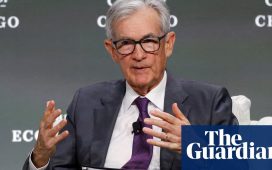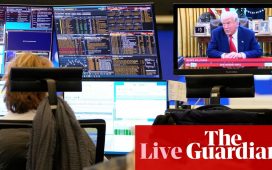Financial markets at risk of ‘sharp correction’, warns Bank of England
Newsflash: The Bank of England has warned that financial markets remain at risk of a sharp correction.
In its latest financial stability report, the BoE says that high inflation, or geopolitical risks, could trigger a selloff.
The Bank says risks to the UK financial system are “broadly unchanged” since the first quarter of the year.
But some asset prices have continued to rise, it points out, while the risk of a sharp correction persists.
European markets are up around 8% so far this year, while the US Nasdaq Composite index has surged by 18%.
The report, which is designed to track the stability of the financial system, says:
The prices of many assets such as shares and bonds remain high relative to historical norms, and some have continued to rise. This suggests that investors in financial markets are continuing to expect the economy to recover and inflation to fall. They are placing less weight on risks, such as geopolitical developments or continued high inflation, that might cause weaker growth or interest rates to stay higher than expected.
These risks make it more likely that there could be a sharp correction in asset prices that could ultimately make it more costly and difficult for UK households and businesses to borrow.
The report also warns that
-
Global risks are material, including geopolitical risks, which remain high.
-
Overall, UK households and businesses have remained resilient to the impact of higher interest rates.
-
The UK banking system is strong enough to support households and businesses, even if the economy does worse than expected.
Key events
US pending home sales fall in May
There are new signs of weakness in the US housing market today.
Contracts to buy U.S. previously owned homes unexpectedly fell in May, by 2.1%, indicating that high mortgage rates and expensive homes are deterring buyers.
The National Association of Realtors (NAR) reported that pending home sales fell in the densely populated South and the Midwest on a monthly basis, but rose in the Northeast and West.
Year-over-year, all U.S. regions registered reductions.
“The market is at an interesting point with rising inventory and lower demand,” said NAR chief economist Lawrence Yun, adding:
“Supply and demand movements suggest easing home price appreciation in upcoming months. Inevitably, more inventory in a job-creating economy will lead to greater home buying, especially when mortgage rates descend.”

Jasper Jolly
Labour shadow business secretary has said the party would rather have stability in the UK’s relationship with the Europe than try to seek accelerated economic growth by rejoining the EU’s single market or customs union.
Addressing the British Chambers of Commerce (BCC) conference on Thursday, Jonathan Reynolds acknowledged that Brexit had been “very difficult for businesses” because it erected trade barriers, but said reopening the debate would be worse.
With less than a week to go until polls open in the general election, Reynolds was trying to woo business leaders at the London event with a pitch that emphasised policy stability and encouraged businesses to invest.
More here.
Back in the UK, a former Bank of England policymaker has predicted the central bank could cut interest rates at its next meeting in August.
Michael Saunders, who served on the Monetary Policy Committee from 2016 to 2022, believes the BoE would start to lower borrowing costs if inflation and wage data align with its forecasts.
Saunders told the Reuters Global Markets Forum (GMF) today:
“They have clearly signalled they are willing to cut soon if data are okay.
“If so, I would expect the rest of the internal (members of the BoE MPC) to move as a bloc to vote for a cut.
The US GDP report shows that America’s manufacturing sector shrank by 1.1% in Q1.
The services sector grew by 1.9%, though, while government added 2.3% more value.
$spx futures currently at the high of day .
– US GDP final report came in higher than expected by 0.1 %
– unemployment claims came within reasonable lines .As long as $spx holds 5460 we are bullish and if 5490 breaks 5530-5520 possible today pic.twitter.com/6d42D4zZdb
— Stock-X (@StockXcapital) June 27, 2024
Despite the small upgrade to US growth in January-March, the economy still slowed compared with the October-December.
Richard Flax, chief investment officer at Moneyfarm, says:
“The third reading on US first quarter GDP came in at an annualised 1.4% according to revised figures, up from the predicted 1.3%, but lower than Q4 2023’s strong print of 3.4%. This tepid growth continues to highlight concern of a broader economic slowdown.
“The increase in real GDP primarily reflected increases in consumer spending, residential fixed investment, non-residential fixed investment, and state and local government spending.
“Looking ahead, forecasts suggest a potential rebound in GDP for the second quarter, with estimates pointing to growth rates of 3% or more, similar to the robust performance seen in the latter half of 2023. However, several factors could temper expectations for the rest of the year, including the state of inflation, high interest rates, and the impending presidential election. All these factors may force businesses to adopt a cautious stance on new investments.”
The number of Americans filing new claims for jobless support has dipped, by 6,000.
There were 233,000 fresh ‘initial claims’ for unemployment support last week, down from 239,000 in the previou seven days.
US initial jobless claims print 233K, in-line with 236K expected.
US Final Q1 GDP also meets expectations at +1.4% y/y.
🥱
— Matt Weller CFA, CMT (@MWellerFX) June 27, 2024
Today’s US GDP report also shows that Americans earned, and saved, a little less than previously estimated in the first quarter of the year.
Disposable personal income increased $240.2 billion, or 4.8 percent, in the first quarter, a downward revision of $26.6 billion from the previous estimate. Real disposable personal income increased 1.3 percent, a downward revision of 0.6 percentage point.
Personal saving was $777.3 billion in the first quarter, a downward revision of $19.3 billion from the previous estimate. The personal saving rate—personal saving as a percentage of disposable personal income—was 3.8 percent in the first quarter, the same as the previous estimate.
US economy grew by 1.4% annual rate in Q1
Just in: the US economy grew a little faster than previously thought in the first quarter of this year.
New data from the Bureau of Economic Analysis show that US gross domestic product increased at an annual rate of 1.4% in the first quarter of 2024.
That’s the equivalent of growing by 0.35% quarter-on-quarter….and is up from the prevoius estimate of 1.3% annualised growth.
The BEA says the increase primarily reflected increases in consumer spending, housing investment, business investment, and state and local government.
But, a fall in inventory investment weighed on GDP, as did a rise in imports.
This chart shows why the Bank of England has concerns about private equity risk management (see earlier post)…
Here’s economist Julian Jessop of the Institute of Economic Affairs on today’s financial stability report:
Two handy charts from the Bank of England’s Financial Stability Report provide a useful reality check on the economic risks from rising mortgage rates… 🤓
1⃣ bad news (not really news) is that another 3 million mortgage payers will roll off cheap fixed rate deals between now… pic.twitter.com/xwLD7CmhCn
— Julian Jessop FRSA (@julianHjessop) June 27, 2024
2⃣ the aggregate debt-servicing burden for mortgagors (mortgage payments relative to post-tax income) is still expected to increase over the next few years, but by less than at the time of the December FSR, and it should remain well below the levels seen in the global financial… pic.twitter.com/ydlmuON9D9
— Julian Jessop FRSA (@julianHjessop) June 27, 2024
Stat of the day from @bankofengland About 30% of #mortgage borrowers are set to be hit by a £100-plus rise in their monthly repayments by the end of 2026. While 34% of homeowners in England are mortgage-free, this still represents a large number of households facing larger bills
— Anne Ashworth (@AnneAshworth) June 27, 2024
Full story: Global wave of elections could hit UK financial system, warns Bank of England

Kalyeena Makortoff
Uncertainty caused by a global wave of elections, starting this weekend in France, risks destabilising the UK’s financial system, the Bank of England has warned.
Officials are concerned about the kind of policies that newly elected governments may enforce in large economies, including the US, where Donald Trump is vying for another term as president in the run-up to the election in November.
The French president Emmanuel Macron’s shock announcement of a parliamentary election, with a first round of voting on 30 June and Marine Le Pen’s far-right National Rally party forecast to make significant gains, had shown how political uncertainty could impact economic growth forecasts and cause volatility in financial markets, affecting government debt prices, the Bank’s financial policy committee (FPC) said.
More here.
There’s no shortage of newsy lines in today’s financial stability report.
Another one, is that the Bank of England believes that risk management in the private equity sector needs improving.
The BoE says an investigation of the sector showed it was facing challenges from higher borrowing costs (because increases in interest rates have hit borrowers who loaded up on debt when it was cheap).
The Bank says:
Although the [private equity] sector has been resilient so far, it is facing challenges in the higher rate environment. These manifest in refinancing risk as debt matures, and an increased drag on performance from higher financing costs.
In response, Michael Moore, chief executive of the BVCA (British Private Equity & Venture Capital Association), says:
The Bank has rightly highlighted the long-term stability and resilience of the private equity industry and the vital role it has played in the UK economy for over 40 years, and we welcome their acknowledgment of the importance of the sector to the economy.
Many of the Bank’s concerns are already being addressed through new regulatory activity by the FCA, and we at the BVCA remain highly engaged in these processes.
Over in the US, retail giant Walgreens Boots is planning to close some underperforming US stores and cut its profit forecasts today.
Walgreen Boots now expects to make an adjusted profit of $2.80 to $2.95 per share for its financial year ending August, compared with its $3.20 to $3.35 per share forecast in March.
The company says it is finalizing a “significant multiyear footprint optimization program” to close certain underperforming US stores.
Chief executive officer Tim Wentworth says Walgreen Boots continues to face “a difficult operating environment”, due to the pressures on US consumers.
He adds:
“Informed by our strategic review, we are focused on improving our core business: retail pharmacy, which is central to the future of healthcare. We are addressing critical issues with urgency and working to unlock opportunities for growth.
Many of these actions will take time, but I am confident that we have the right team and the right strategy to lead a business turnaround for the Walgreens that our customers and patients need.”
Today’s Financial Stability Report recognises the forthcoming French elections as a potential geopolitical risk, points out Professor Costas Milas, of the University of Liverpool’s management school:
In light of the forthcoming French elections, the French cost of borrowing continues to rise -albeit slightly- over the past week as does the Italian one.
My brand new piece for the LSE Business Review blog looks at the rising political uncertainty in France and assesses the risk of contagion effects in Europe and the UK through the banking channel. European and British banks have a notable exposure to French public and domestic debt (around 10% their total exposure worldwide), which (according to the Chart in the piece) has increased over time.
Something for ECB’s and BoE’s monetary policymakers to keep an eye on over the next few days and weeks…
BoE: China property slowdown could post spillover risks
The Bank of England also warns that “significant downside risks remain” from China’s property market.
Today’s financial stability report points out that activity in the mainland Chinese residential property sector continues to decrease, with the prices of new and existing homes falling this year:
Disorderly defaults by property developers have been avoided so far, the Bank of England says, even though some large Chinese property developers have missed bond payments without agreed extensions.
Chinese authorities have put various measures into place to support the housing market, which has helped support housing demand.
The Bank warns, though, that the ongoing market adjustment will weigh on China’s economy for some time – and could potentially spill over to the UK economy, saying:
The adjustment in the property sector, alongside broader structural trends, is likely to weigh on growth in China for some time. Property accounts for a significant proportion of household wealth in China; much higher than in the US, for example. That means falls in sales and residential property prices are likely to continue to impact Chinese consumption and growth.
There have been limited spillovers to the UK so far from the adjustment in mainland China’s property market. However, significant downside risks remain. More widespread crystallisation of risks in mainland China could lead to spillovers to the UK and other countries, and could be larger if the crystallisation of property sector vulnerabilities were to spread to other sectors in the Chinese economy. Risks could spill over to the UK financial system through channels including weaker trade, financial markets, and global risk sentiment.
Today’s Bank of England’s report shows high borrowing costs still pose a threat to the stability of the financial system, points out Karim Haji, global and UK head of financial services at KPMG.
Haji adds that banks need to keep supporting customers who need help:
“While there are signs that a brighter economic outlook is starting to feed through to resilient consumers and businesses, the Bank of England’s report shows high borrowing costs still pose a threat to the stability of the financial system.
The good news is UK banks are in rude health, with strong capital and liquidity positions allowing them to support people even if the economy does worse than expected. It is incumbent on them to continue supporting vulnerable customers.”
BoE: Elections to add to financial volatility
The Bank of England is concerned that the flurry of elections taking place this year could cause financial instability.
Today’s report says:
Geopolitical risks remain high and there is policy uncertainty associated with elections set to take place globally. This could make the global economic outlook less certain and lead to financial market volatility.
The Bank cites the drop in French government bond prices, and shares in Paris, this month after Emmanuel Macron called snap parliamentary elections.
They say:
Markets responded to the unexpected announcement that French parliamentary elections would be held on 30 June and 7 July. For example, the spread between French and German 10-year government bond yields rose to its highest level since 2017.
The US presidential elections, in November, are also an obvious source of risk and uncertainty, with Joe Biden and Donald Trump due to face off in a debate tonight.
The City has been unspooked by the UK election next week, though, with JP Morgan suggesting that a Labour election victory will be a “net positive” for financial markets.









